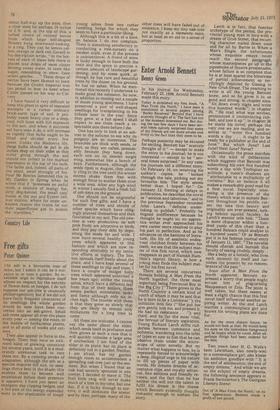Enter Arnold Bennett
Benny Green
In his journal for Wednesday, February 23, 1898, Arnold Bennett made this entry: Today is published my first book, "A Man From the North." I have seen it mentioned in several papers among ' Books Received.' Beyond that I have scarcely thought of it. The fact has not at the moment interested me. But during the last few days I have been several times naively surprised that some of my friends are not more awake and lively to the fact than they seem to be.
Perhaps posterity may be excused for smiling. Bennett has " scarcely thought of it" — except to make the entry in his journal; he is not interested — except to be "several times surprised." In any case, his journals tell a different story. On February 16, on receiving his author's copies, he "looked through the tale, picking out my favourite bits. The style seems better than I hoped for." On January 12, fretting at delays in publication, he describes the novel as "serious and laborious," and in the previous September recorded John Lane's "definite undertaking to publish." Probably he feigned indifference because he thought he ought to; no apprentice writer ever approached his own career more resolved to play his part to perfection. And as he advances on the bastions of literature, the lily of aesthetic endeavour clutched firmly between his teeth, we see that the subject matter of this first novel, which now reappears as part of Hamish Hamilton's reprint library, is how a young man finds the subject matter for his first novel.
There are several concurrent threads holding A Man From the North together, the three most important being Provincial Boy in the Big City (" There grows in the North Country a certain kind of youth of whom it may be said that he is born to be a Londoner "); the initiation into Sex (" She put her arm gently into his, and pressed it. He had no resistance . ."); and third, and by far the most vital, the fervour of literary aspiration. Young Richard Larch drifts rudderless between commerce and bohemia, wandering into the orbit of types so new to him that he can observe them under the microscope of utter novelty. But no matter what happens to him, he is repeatedly forced to acknowledge a deep, illogical urge in his nature to fill up pieces of paper with words. He dreams dreams of acceptance slips and royalty advances, fine editions and friendly reviews, and the fact that he has neither the will nor the talent to fulfil his dream is the theme which Bennett evidently thought romantic enough to sustain the story. Larch is in fact, that familiar archetype of the period, the provincial young man in love with a dream of Grub Street, that recurring character nailed down once and for all by Barrie in When a Man's Single, the unfortunate whose exquisite essays never reach the second paragraph, whose masterpieces go up in the pipesmoke of theatre promenades, whose failure is so complete that he is at least spared the bitterness of partial achievement so terrifyingly depicted by Gissing in New Grub Street. The yearning to write is all the young Bennett knew, and so he gives it to us good and strong; in chapter nine, "Sit down every night and write five hundred words "; in chapter 26, "He read what was written, pronounced it unconvincing rubbish, and tore it up "; in chapter 28 he starts his novel, perhaps the very one we are reading, and resolves to "write five hundred words a day . . . it ought to be ready for a publisher at the end of June." But which June? Last June? Next June? Never?
Occasionally the prose marches with the kind of deliberation which suggests that Bennett was subscribing his own five hundred words a day with Trollopian exactitude; a room's shadows are "attributable to a multiplicity of curtains." But on balance it all makes a remarkably good read for a first novel. Especially interesting is the presence of the theory which was to sustain Bennett throughout his prolific career, the idea that beauty and originality are ever-present, lurking behind squalid facades. As Larch's mentor tells him, "There is more character within a hundred yards of this chair than a hundred Balzacs could analyse in a hundred years." Or as Bennett put it in his famous journal entry of January II, 1897, "The novelist should cherish and burnish this faculty of seeing crudely, simply . like a baby or a lunatic, who lives each moment by itself and tarnishes the present by no remembrance of the past."
Soon after A Man From the North appeared, Ben nett expressed a worry that people might accuse him of plagiarising Maupassant or Zola. The point is well taken, but there seems at least a slight chance that this first novel itself influenced another aspiring writer. At the end Larch marries a commonplace girl and knows his writing plans are done for: As for the more distant future, he would not look at that. He would keep his eyes on the immediate foreground and be happy while he could. After all, perhaps things had been ordered for the best.
Two years later H. G. Wells's hero Lewisham, also newly-wed to a commonplace girl, also kisses his ambition goodbye with "It is the end of adolescence, the end of empty dreams." And while we are on the subject of empty dreams, the following sentence appears in Frank Swinnerton's The Georgian Literary Scene: Out of 'A Man From the North,' on its first appearance. Bennett made a profit of one pound.






























 Previous page
Previous page